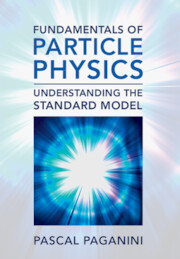Book contents
- Frontmatter
- Dedication
- Contents
- Preface
- Notation and Constants
- 1 Particle Physics Landscape
- 2 Preliminary Concepts: Special Relativity and Quantum Mechanics
- 3 Collisions and Decays
- 4 Conservation Rules and Symmetries
- 5 FromWave Functions to Quantum Fields
- 6 A Brief Overview of Quantum Electrodynamics
- 7 From Hadrons to Partons
- 8 Quantum Chromodynamics
- 9 Weak Interaction
- 10 Electroweak Interaction
- 11 Electroweak Symmetry Breaking
- 12 The Standard Model and Beyond
- Appendix A Elements of Group Theory for Particle Physics
- Appendix B Special Unitary Group SU(2)
- Appendix C Special Unitary Group SU(3) and SU(N)
- Appendix D Lorentz and Poincaré Groups
- Appendix E Calculating with the Dirac Delta Distribution
- Appendix F Contour Integration in the Complex Plane
- Appendix G Useful Formulas with γ Matrices
- Appendix H Fermi’s Golden Rule and Time-Dependent Perturbation
- References
- Index
8 - Quantum Chromodynamics
Published online by Cambridge University Press: 31 August 2023
- Frontmatter
- Dedication
- Contents
- Preface
- Notation and Constants
- 1 Particle Physics Landscape
- 2 Preliminary Concepts: Special Relativity and Quantum Mechanics
- 3 Collisions and Decays
- 4 Conservation Rules and Symmetries
- 5 FromWave Functions to Quantum Fields
- 6 A Brief Overview of Quantum Electrodynamics
- 7 From Hadrons to Partons
- 8 Quantum Chromodynamics
- 9 Weak Interaction
- 10 Electroweak Interaction
- 11 Electroweak Symmetry Breaking
- 12 The Standard Model and Beyond
- Appendix A Elements of Group Theory for Particle Physics
- Appendix B Special Unitary Group SU(2)
- Appendix C Special Unitary Group SU(3) and SU(N)
- Appendix D Lorentz and Poincaré Groups
- Appendix E Calculating with the Dirac Delta Distribution
- Appendix F Contour Integration in the Complex Plane
- Appendix G Useful Formulas with γ Matrices
- Appendix H Fermi’s Golden Rule and Time-Dependent Perturbation
- References
- Index
Summary
This chapter is divided into two parts. The first part introduces the quark model, following more or less the historical developments. It led to an approximate symmetry, based on the SU(3) flavour group, where u, d and s quarks are the three degrees of freedom. The second part introduces the quantum chromodynamics theory (QCD), i.e. the true formal gauge theory of the strong interaction. Here again, the symmetry group is SU(3), but the degrees of freedom are the three quark colours. This symmetry is assumed to be exact, which has consequences on the existence of gluons and their properties, the carriers of the strong interaction at the elementary particle level, briefly mentioned in the previous chapter. The QCD interaction is the first non-Abelian interaction encountered in the book. The non-perturbative regime of QCD is also presented with a short introduction to lattice QCD. A discussion about the colour confinement and the hadronisation of quarks is also given.
Information
- Type
- Chapter
- Information
- Fundamentals of Particle PhysicsUnderstanding the Standard Model, pp. 249 - 328Publisher: Cambridge University PressPrint publication year: 2023
